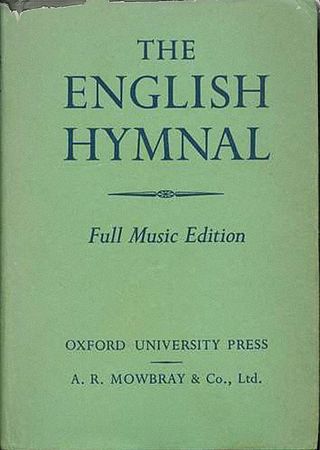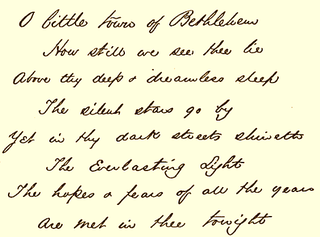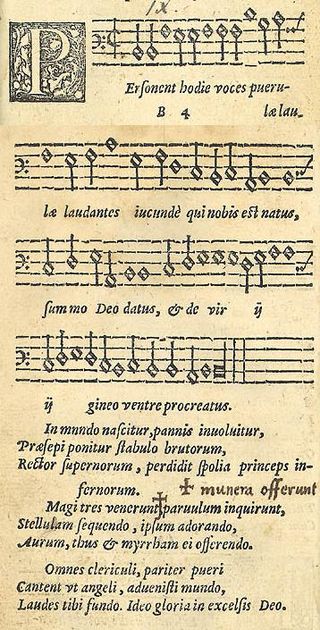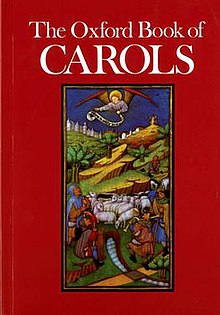
A Christmas carol is a carol on the theme of Christmas, traditionally sung at Christmas itself or during the surrounding Christmas holiday season. The term noel has sometimes been used, especially for carols of French origin. Christmas carols may be regarded as a subset of the broader category of Christmas music.
A carol is a festive song, generally religious but not necessarily connected with Christian church worship, and sometimes accompanied by a dance. A caroller is someone who sings carols, and is said to be carolling.

Fantasia on a Theme by Thomas Tallis, also known as the Tallis Fantasia, is a one-movement work for string orchestra by Ralph Vaughan Williams. The theme is by the 16th-century English composer Thomas Tallis. The Fantasia was first performed at Gloucester Cathedral as part of the 1910 Three Choirs Festival, and has entered the orchestral repertoire, with frequent concert performances and recordings by conductors and orchestras of various countries.
"The First Nowell", modernised as "The First Noel" ", is a traditional English Christmas carol with Cornish origins most likely from the early modern period, although possibly earlier. It is listed as number 682 in the Roud Folk Song Index.

The English Hymnal is a hymn book which was published in 1906 for the Church of England by Oxford University Press. It was edited by the clergyman and writer Percy Dearmer and the composer and music historian Ralph Vaughan Williams, and was a significant publication in the history of Anglican church music.
"We Wish You a Merry Christmas" is an English Christmas carol, listed as numbers 230 and 9681 in the Roud Folk Song Index. The famous version of the carol is from the English West Country.

The New Oxford Book of Carols is a collection of vocal scores of Christmas carols. It was first published in 1992 by Oxford University Press (OUP) and was edited by Hugh Keyte and Andrew Parrott. It is a widely used source of carols in among choirs and church congregations in Britain.

"O Little Town of Bethlehem" is a Christmas carol. Based on an 1868 text written by Phillips Brooks, the carol is popular on both sides of the Atlantic, but to different tunes: in the United States, to "St. Louis" by Brooks' collaborator, Lewis Redner; and in the United Kingdom, Canada, and Ireland to "Forest Green", a tune collected by Ralph Vaughan Williams and first published in the 1906 English Hymnal.

Percival Dearmer (1867–1936) was an English Anglican priest and liturgist best known as the author of The Parson's Handbook, a liturgical manual for Anglican clergy, and as editor of The English Hymnal. A lifelong socialist, he was an early advocate of the public ministry of women and concerned with social justice. Dearmer, with Ralph Vaughan Williams and Martin Shaw, is credited with the revival and spread of traditional and medieval English musical forms. His ideas on patterns of worship have been linked to the Arts and Crafts Movement, while The English Hymnal reflects the influence both of artistic and folkloric scholarship and Christian Socialism. At his death, he was a canon of Westminster Abbey, from where he ran a canteen for the unemployed.

Martin Edward Fallas Shaw was an English composer, conductor, and theatre producer. His over 300 published works include songs, hymns, carols, oratorios, several instrumental works, a congregational mass setting, and four operas including a ballad opera.
The "Sussex Carol" is a Christmas carol popular in Britain, sometimes referred to by its first line "On Christmas night all Christians sing". Its words were first published by Luke Wadding, a 17th-century Irish bishop, in a work called Small Garland of Pious and Godly Songs (1684). It is unclear whether Wadding wrote the song or was recording an earlier composition.

Monk's Gate is a hamlet in the civil parish of Nuthurst, in the Horsham District of West Sussex, England. It lies on the A281 road 3 miles (5 km) southeast from Horsham.

Reginald Owen Morris, known professionally and by his friends by his initials, as R.O. Morris, was a British composer and teacher.
Songs of Praise is a 1925 hymnal compiled by Percy Dearmer, Martin Shaw and Ralph Vaughan Williams. The popular English Hymnal of 1906 was considered too 'High church' by many people, and a new book on broader lines was indicated. It was initially to be called Songs of the Spirit but in the end the title was changed to Songs of Praise, from the hymn by J. Montgomery, "Songs of Praise the angels sang". Musically, it deliberately omitted several Victorian hymn tunes and substituted "modal" tunes by Shaw and Gustav Holst and descants by Vaughan Williams and by Martin Shaw's brother Geoffrey Shaw.

"Personent hodie" is a Christmas carol originally published in the 1582 Finnish song book Piae Cantiones, a volume of 74 Medieval songs with Latin texts collected by Jacobus Finno, a Swedish Lutheran cleric, and published by T.P. Rutha. The song book had its origins in the libraries of cathedral song schools, whose repertory had strong links with medieval Prague, where clerical students from Finland and Sweden had studied for generations. A melody found in a 1360 manuscript from the nearby Bavarian city of Moosburg in Germany is highly similar, and it is from this manuscript that the song is usually dated.

"Puer nobis nascitur", usually translated as "Unto Us Is Born a Son", is a medieval Christmas carol found in a number of manuscript sources—the 14th-century German Moosburg Gradual and a 15th-century Trier manuscript. The Moosburg Gradual itself contained a number of melodies derived from the 12th- and 13th-century organum repertories of Notre Dame de Paris and the Abbey of Saint Martial, Limoges, suggesting that its antiquity may be much greater.
The Lord at first did Adam make, alternatively The Lord at first had Adam made is a traditional English Christmas carol which was collected and first published in 1822 in Davies Gilbert's collection Some Ancient Christmas Carols...Formerly Sung in the West of England. The carol relates the events of Genesis, Chapter 3, relating the evils that have befallen humanity since that first fall and humanity's subsequent redemption; during Advent, a traditional theme is of the birth of Jesus being the coming of the "Second Adam".
"The Rocking Carol", also known as "Little Jesus, Sweetly Sleep" and "Rocking", is an English Christmas carol by Percy Dearmer. It was translated from Czech in 1928 and is performed as a lullaby to the baby Jesus. The carol has also been known in English as the "Rocking" carol since an American edition in 1963. The carol has been recorded by Julie Andrews, Roger Whittaker and other artists.
The Gloucestershire Wassail, also known as "Wassail! Wassail! All Over the Town", "The Wassailing Bowl" and "Wassail Song" is an English Christmas carol from the county of Gloucestershire in England, dating back to at least the 18th century, but may be older.











